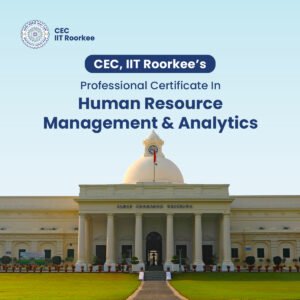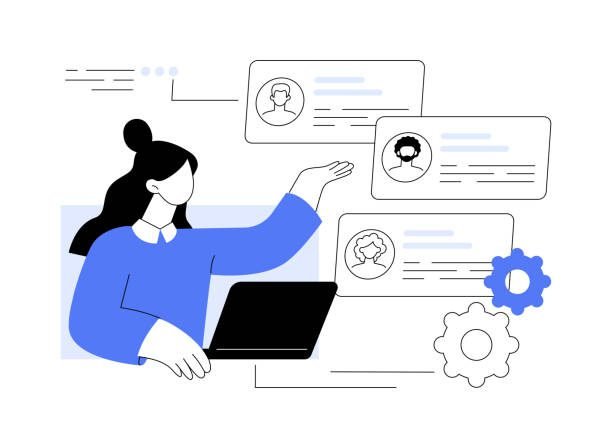Last updated on August 13th, 2024 at 08:26 am
In today’s data-driven world, human resources (HR) departments are no longer just about hiring. They play a crucial role in shaping the company’s culture, improving employee satisfaction, and driving business success. But how do HR professionals make these critical decisions?
HR analytics helps managers move away from making decisions based on personal experiences, company hierarchy, or trying to avoid risks. Instead, it uses data analysis, predictions, and experiments to make better decisions.
The answer lies in HR analytics. This blog post will delve into what HR analytics is, the various types of HR analytics, what HR analytics is used for, the importance of HR analytics, and how an HR Manager Course can equip you with the skills needed to excel in this field.
What is HR Analytics?
At its core, HR analytics refers to the process of collecting & analyzing Human Resource (HR) data to improve an organization’s workforce performance. This data-driven approach helps HR professionals make more informed decisions, predict future trends, and align HR strategies with business goals.
But what is HR analytics beyond this basic definition? It’s a powerful tool that turns data into actionable insights, enabling HR departments to understand patterns, identify issues, and uncover opportunities within their workforce.
Types of HR Analytics
Understanding the different types of HR analytics is essential for leveraging its full potential. Here are the main categories:
-
Descriptive Analytics:
What it is: This type focuses on describing historical data and identifying trends.
Usage: It answers questions like “What happened?” and “What is happening?”
Example: Employee turnover rates over the past year.
-
Diagnostic Analytics:
What it is: This digs deeper into the data to understand the reasons behind trends.
Usage: It answers questions like “Why did it happen?”
Example: Analyzing the factors contributing to high turnover rates.
-
Predictive Analytics:
What it is: This type uses statistical models and forecasts to predict future outcomes.
Usage: It answers questions like “What is likely to happen?”
Example: Predicting future employee turnover based on current trends.
-
Prescriptive Analytics:
What it is: This type suggests possible courses of action based on predictive analytics.
Usage: It answers questions like “What should we do?”
Example: Recommending specific HR strategies to reduce turnover.
By understanding these types of HR analytics, HR professionals can choose the right approach to address their specific needs and challenges.

The Power of HR Analytics
So, what is HR analytics used for? The applications are vast and varied, providing value across multiple HR functions:
-
Talent Acquisition:
Usage: Identifying the best sources for recruitment, predicting candidate success, and optimizing the hiring process.
Benefit: Streamlines recruitment efforts and improves the quality of hires.
-
Employee Retention:
Usage: Analyzing factors leading to employee turnover & predicting which employees are at risk of leaving
Benefit: Enables proactive measures to retain top talent.
-
Performance Management:
Usage: Evaluating employee performance metrics and identifying areas for improvement
Benefit: Enhances overall productivity and helps in career development planning.
-
Workforce Planning:
Usage: Forecasting future workforce needs based on business growth and strategic goals
Benefit: Ensures the organization has the right talent at the right time.
-
Employee Engagement:
Usage: Measuring employee satisfaction and engagement levels through surveys and feedback
Benefit: Helps in creating a positive work environment and boosting morale.
These are just a few examples of what HR analytics is used for. Its ability to provide insights across various HR functions makes it an invaluable tool for any organization.
What is the Importance of HR Analytics?
The importance of HR analytics cannot be overstated. Here are some key reasons why HR analytics is crucial for modern businesses:
-
Data-Driven Decision Making:
Importance: Moves HR from intuition-based to evidence-based decision-making.
Impact: Leads to more accurate and effective HR strategies.
-
Improved Employee Experience:
Importance: Identifies areas of improvement in the employee lifecycle.
Impact: Enhances job satisfaction and retention rates.
-
Cost Efficiency:
Importance: Helps in identifying cost-saving opportunities through efficient HR practices.
Impact: Reduces recruitment, training, and operational costs.
-
Strategic Alignment:
Importance: Aligns HR strategies with overall business goals
Impact: Ensures that HR efforts contribute to the organization’s success.
-
Competitive Advantage:
Importance: Provides insights that help in staying ahead of competitors.
Impact: Attracts and retains top talent, fostering innovation and growth.
Understanding the importance of HR analytics helps organizations realize the potential benefits and encourages the adoption of data-driven HR practices.
The Digital Transformation in HR and the Rise of Data-Driven Methods
Human Resources (HR) has changed dramatically in recent years, moving from manual processes to a more digital approach. This change, driven by new technology, responds to the needs of a global workforce, the demands of a new generation of employees, and the complex challenges businesses face today.
As a result, data-driven methods are becoming more common in HR, turning decisions based on intuition into strategies backed by evidence. Using data helps HR professionals see patterns, predict results, and make choices that better align with company goals and employee well-being.
As companies deal with issues like hiring, keeping employees, and the evolving nature of work, data-driven insights are incredibly valuable. They provide clear insights into areas that need improvement, employee feelings, and the overall health of the organization. Unlike traditional HR, which often relied on occasional surveys or feedback, the digital shift ensures a constant stream of information, allowing for real-time responses and more personalized strategies.
This rise of data-driven methods is also changing the role of HR in companies. HR is no longer just an administrative or support role; it’s becoming a strategic partner. HR professionals now use data to guide business decisions, shape company culture, and drive innovation. This new role highlights the importance of continuous learning and adaptability for HR professionals, as they need to stay updated not just with HR tools but also with broader data analytics techniques and tools.
Conclusion: Embracing the Power of HR Analytics
The power of HR analytics lies in its ability to transform HR practices through data-driven insights. The importance of HR analytics is evident in its impact on decision-making, employee experience, cost efficiency, strategic alignment, and competitive advantage.
For HR professionals looking to excel in this field, an HR Manager Course offers the training and skills needed to utilize HR analytics effectively. Embracing HR analytics not only empowers HR departments but also positions the organization for long term success in an increasingly competitive landscape.
Comprehensive Human Resource Management Program by Imarticus Learning
The Imarticus Learning human resource management program is designed to equip applicants with the knowledge and skills necessary to manage human resources in today’s dynamic business environment effectively.
The curriculum spans a broad array of topics, including job analysis and design, strategies for hiring, selecting, and retaining employees, performance management and appraisal, training and development, compensation and benefits, skill and competency development, diversity management, organizational culture creation, and employee engagement.
The HR analytics course uniquely combines academic expertise from IIT Roorkee and industry insights from top companies. Take the next step in your professional journey. Enrol today in the Imarticus Learning human resource management program and gain the expertise to excel in the modern business environment.
Secure your future with cutting-edge knowledge and industry-recognized certification!

